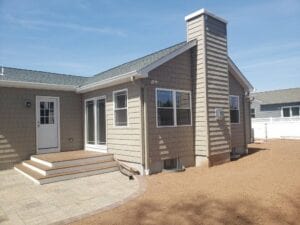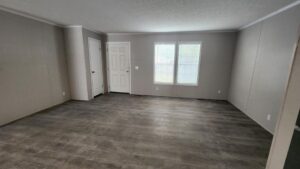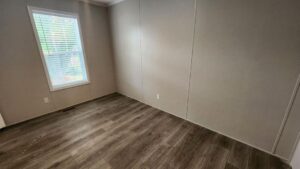Are you looking for ways to add more living space or increase the value of your mobile home? In this article Mobile Home Additions: The Ultimate Guide we will discuss all the options of additions to your home.

Mobile Home Additions
A mobile home addition might be just what you need. With proper planning and execution, building an addition onto your manufactured home can provide you with extra room for your growing family or even serve as a rental property in a mobile home park.
But before you start planning, it’s important to understand that adding onto a mobile home requires specific considerations. From laying proper footings and foundations to framing and flashing, there are several crucial steps involved in building a successful addition.
Adding Value to Your Mobile Home
One benefit of adding onto a mobile home is the potential increase in value. By adding an extra bathroom or carport, for example, you can make your house more appealing to potential buyers if you decide to sell it in the future.
However, it’s important to note that building an addition on a mobile home is not always straightforward. You’ll need to consider factors such as zoning laws, permits, and regulations specific to your area before beginning any construction.
From the basics of footers and foundations to tips on framing and flashing, we’ve got you covered. So whether you’re wondering how to put an addition on a mobile home or simply exploring your options for expanding your living space, read on for all the information you need.
Pros and Cons of DIY Mobile Home Additions Versus Hiring a Professional
Hiring a Professional Contractor Can Save Time
Hiring a professional contractor can save time and ensure proper construction and design. Licensed contractors have the experience, knowledge, and tools necessary to complete the job efficiently without sacrificing quality. They know what permits are required for building codes in your area, which materials will work best for your specific project, and how to avoid potential issues that may arise during construction.

Hiring a professional contractor also ensures that your addition is up to code. This is important because an unpermitted or improperly constructed addition can lead to fines or even legal action if it violates local laws. Hiring a licensed contractor provides you with peace of mind knowing that the job will be done correctly the first time around.
DIY Additions May Seem Like a Good Idea
While DIY additions may seem like a good idea at first glance, people need to keep in mind the potential issues that may arise. One of the biggest concerns with DIY projects is safety. Without proper training or experience, individuals may accidentally injure themselves while working on their addition.
Another issue with DIY additions is cost. While it may seem like you’ll save money by doing it yourself, there’s always the risk of making costly mistakes along the way. These mistakes could end up costing you more than if you had hired a professional from the start.
Finally, DIY additions can take much longer than expected due to lack of experience or knowledge. This means that you’ll have to put off enjoying your new addition until it’s completed which can be frustrating for some homeowners.
Adding Porches to a Mobile Home Can Be a Great Idea
Adding porches to a mobile home can be a great idea, but frost heave may cause problems if not properly addressed. Frost heave occurs when water in the soil freezes and expands, causing the ground to shift and potentially damage your porch’s foundation.
To avoid this issue, it’s important to hire a professional contractor who knows how to properly prepare the ground for your porch. They’ll know what materials to use and how deep to dig to ensure that your porch is stable and secure.
Building a Separate Structure for an Addition
Building a separate structure for an addition may require additional permits and inspections which can be handled more efficiently by a professional. A licensed contractor will know what permits are needed for building codes in your area and can handle all of the necessary paperwork on your behalf.
Hiring a professional contractor ensures that your addition is up to code. This is important because an unpermitted or improperly constructed addition can lead to fines or even legal action if it violates local laws.
Guidelines for Adding Onto a Mobile Home
Adding onto a mobile home may seem like a daunting task, but with the right guidance and knowledge of building codes and regulations, it can be done successfully. Here are some guidelines to help homeowners navigate the process of adding onto their mobile homes.
Building Codes and Regulations Must Be Followed When Adding Onto a Mobile Home
Building codes and zoning regulations must be followed when adding onto a mobile home. These regulations ensure that the addition is safe, structurally sound, and meets environmental standards. It is essential to check with local government offices to determine what permits are required before starting any construction project.
Mobile homes have specific requirements for additions because they are not considered permanent structures like traditional homes. Therefore, homeowners should consult with professionals who specialize in mobile home additions to ensure that all regulations are met.
A Guide Can Help Homeowners Navigate the Regulations for Mobile Home Additions
Navigating building codes and zoning regulations can be challenging for homeowners who want to add onto their mobile homes. A guide can provide valuable information on how to comply with these regulations while ensuring that the addition is safe and structurally sound.
Several guides are available online or through local government offices that provide step-by-step instructions on how to add onto a mobile home safely. They also include information on obtaining necessary permits, selecting contractors, and choosing materials that meet environmental standards.
Mobile Home Additions Must Comply With Local Building Codes and Zoning Regulations
Local building codes vary from state to state, so it is crucial to research what requirements exist in your area before beginning any construction project. Zoning laws dictate where structures can be built on properties based on factors such as lot size, setbacks from property lines or other buildings, and height restrictions.
Mobile home additions must comply with these rules as well as those set forth by federal agencies such as HUD (Housing and Urban Development). Failing to comply with these regulations can result in fines or legal issues.
Failure to Follow Regulations Can Result in Fines or Legal Issues
Failure to follow building codes and zoning regulations when adding onto a mobile home can lead to significant problems. Homeowners may face fines, legal action, or even the removal of their addition if it is deemed unsafe or structurally unsound.
Therefore, it is crucial to work with professionals who specialize in mobile home additions and have experience navigating local building codes and zoning regulations. These experts can ensure that all necessary permits are obtained, and the addition meets all environmental standards while being safe for occupants.

Financing and Insurance Options for Mobile Home Additions
If you’re considering adding an addition to your mobile home, there are several financing and insurance options to consider. Here’s what you need to know about financing and insurance for mobile home additions.
Looking for mobile home insurance click this link to learn more: Tiny House Insurance. Customers save $250 on average over other insurance providers.
Financing Options for Mobile Home Additions
Financing a mobile home addition can be done through personal loans or home equity loans. Personal loans are unsecured loans that don’t require collateral, while home equity loans use the equity in your mobile home as collateral.
Personal loans may be a good option if you have good credit and don’t want to put up any collateral. However, they often come with higher interest rates than secured loans like home equity loans. You’ll also need to have a steady income and a low debt-to-income ratio to qualify for a personal loan.
Home Equity Loans and Additions
Home equity loans may be a better option if you have significant equity in your mobile home. These types of loans typically offer lower interest rates than personal loans since they’re secured by the value of your property. However, keep in mind that defaulting on a home equity loan could result in losing your mobile home.
Before applying for financing, it’s important to check with lenders about their specific requirements for mobile homes. Some lenders may require inspections before approving financing for an addition.
Insurance Coverage for Mobile Home Additions
Insurance coverage for mobile homes can vary depending on the type of addition and the state in which the mobile home is located. In general, most standard homeowners’ insurance policies will cover damage caused by perils like fire, wind, hail, lightning, theft or vandalism.
However, if you add an addition onto your mobile home that increases its value significantly or changes its structure significantly (such as adding an additional story), you may need additional coverage beyond what is offered under standard homeowners’ insurance policies.
Some states have specific regulations regarding insurance coverage for mobile homes. For example, some states require mobile home owners to carry liability insurance, while others do not. It’s important to check with your state’s insurance department to find out what coverage is required.
Inspections may also be required by insurance companies before approving coverage for a mobile home addition. These inspections can help identify potential hazards and ensure that the addition meets local building codes.
Impact on Car Insurance Rates
If you’re planning on transporting your mobile home after adding an addition, it’s important to note that this could potentially impact your car insurance rates. This is because the added weight of the mobile home could increase the risk of accidents or damage during transportation.
It’s important to notify your car insurance company if you plan on transporting your mobile home after adding an addition. They can help you determine whether additional coverage is needed and how much it will cost.
Cost Considerations For Building Mobile Home Room Additions
Adding extra space to your mobile home is an excellent way to increase its value and provide more living space for you and your family. However, before starting any construction project, it’s essential to consider the cost of the project. Here are some cost considerations you should keep in mind while planning a room addition on your mobile home.
The Average Cost of Mobile Home Additions
The cost of adding mobile home additions varies depending on several factors such as the size and complexity of the project. On average, expect to pay between $200-$300 per square foot when building an addition on a mobile home. This estimate includes materials, labor costs, permits, and other expenses.
Factors That Affect The Cost Of Building Mobile Home Additions
Several factors can influence the overall cost of building an addition on your mobile home:
Size: The larger the addition, the more expensive it will be.
Complexity: If you’re adding features like plumbing or electrical wiring that require additional work beyond standard construction practices, it will add up to your total costs.
Materials: Your choice of materials can significantly impact the overall cost of your project.
Location: Building codes vary from state-to-state and county-to-county; this means that permit fees may differ depending on where you live.
How To Build A Room Addition On A Mobile Home?
Building an addition onto a mobile home is similar to constructing one onto a traditional house. However, there are specific requirements that must be met when working with manufactured homes.
Here are some steps for building an addition onto your mobile home:
Determine what type of room you want to add
Create a detailed floor plan
Acquire all necessary permits
Prepare site and foundation
Install framing
Add roof and siding
Install windows and doors
Finish interior and exterior
What Rooms Can You Add?
The possibilities are endless. Here are some popular rooms you can add:
Extra bedroom
Living room
Dining room
Home office
Sunroom or enclosed porch
Guest room
How Long Does It Take To Build Mobile Home Additions?
The time it takes to build an addition on a mobile home depends on several factors such as the size of the project, materials used, and weather conditions.
On average, building a room addition can take anywhere from two to six months to complete. However, this timeline may vary depending on various factors.
Budget-Friendly Options For Mobile Home Additions
Mobile homes are an affordable housing option that offers flexibility and convenience. However, as families grow or lifestyles change, you may find yourself in need of more living space. Fortunately, there are budget-friendly options for mobile home additions that can help you achieve your goals without breaking the bank.
Adding a Deck or Porch
One of the easiest ways to add extra living space to your mobile home is by adding a deck or porch. This addition not only provides additional outdoor living space but also adds value to your property. A deck or porch can be built using a variety of materials such as wood, composite, or vinyl, depending on your preference and budget.
Considerations:
Check local building codes before starting construction.
Choose materials that are durable and low-maintenance.
Consider adding features like lighting and seating to enhance the functionality of the space.
Read more on our articles: Mobile Home Deck Plans or Mobile Home Steps
You also might be interested in Mobile Home Back Porch Ideas.
Remodeling a Bathroom
Remodeling a bathroom is another great way to improve the look and functionality of your mobile home. Upgrading fixtures and finishes can give your bathroom a fresh new look while improving its performance. Installing energy-efficient appliances can save you money on utility bills over time.
Considerations:
Plan out your remodeling project carefully to avoid unexpected costs.
Choose fixtures and finishes that fit within your budget.
Hire a professional if necessary to ensure proper installation.
Adding Storage
As families grow or lifestyles change, storage needs often increase. Adding storage is an excellent way to support changes in family size without adding weight to the roof of your mobile home. There are many options for adding storage such as built-in cabinets, shelving units, or even outdoor sheds.
Considerations:
Determine what type of storage will best suit your needs.
Choose materials that are durable and weather-resistant.
Ensure proper installation to prevent damage from shifting during transport.
Changes in Floor Plans: Mobile Home Additions
Making changes to the floor plan of your mobile home can significantly increase living space and improve functionality. However, it’s essential to check local codes for single wide homes before making any modifications. Some changes may not be permitted due to safety concerns or building code restrictions.
Considerations:
Consult with a professional contractor or architect before making any significant changes.
Consider the cost-benefit of each modification.
Choose materials that are durable and easy to maintain.
Best Mobile Home Additions to Consider for Added Value
Mobile homes are a popular housing option for many people due to their affordability and flexibility. However, as families grow or needs change, homeowners may find themselves in need of more space. Luckily, there are several mobile home additions that can add value and functionality to your home.
Home Additions Can Add Value to a Mobile Home
Adding square footage to your mobile home not only increases its value but also enhances its functionality. Whether you’re looking to add an extra bedroom or expand your living space, there are several options available.
A Bedroom Addition is a Popular Choice for Added Space
One of the most common additions made to mobile homes is an extra bedroom. This addition is especially useful if you have children who need their own space or if you frequently host guests. Adding a bedroom can also increase the resale value of your home.
When considering adding a bedroom, it’s important to think about the placement and size of the room. You’ll want to make sure that it’s situated in an area that doesn’t disrupt the flow of your home and that it’s large enough to comfortably fit a bed and other furniture.
Adding Extra Space Can Increase the Functionality of a Mobile Home
In addition to adding bedrooms, there are other ways you can increase the square footage of your mobile home. For example:
Expanding Your Living Room: If you frequently entertain guests or simply want more space for relaxing with family members, consider expanding your living room.
Building a Sunroom: A sunroom is an excellent way to bring natural light into your home while providing additional space for relaxation.
Creating Additional Storage Space: Many mobile homes lack adequate storage space. By adding closets or built-in shelving units, you can create more storage without taking up valuable floor space.
Consider the Cost and Feasibility of Each Mobile Home Addition
Before committing to any home addition, it’s important to consider the cost and feasibility of the project. Depending on the scope of the work, you may need to obtain permits or hire a contractor. Some additions may be more expensive than others.
When deciding which addition is right for your home, take into account your budget as well as your long-term goals. Consider how each addition will impact your daily life and whether it will add value to your home in the future.
Mobile Home Additions: Key Takeaways
Adding onto a mobile home can be an exciting, yet overwhelming project.
Firstly, it’s important to weigh the pros and cons of DIY additions versus hiring a professional. While DIY may save money, it can also lead to costly mistakes and safety hazards. Hiring a professional ensures quality workmanship and adherence to building codes.
Secondly, guidelines for mobile home additions must be followed carefully to ensure structural integrity and safety. This includes obtaining necessary permits and adhering to local building codes.
Thirdly, financing and insurance options for mobile home additions should be considered before beginning the project. Some insurance companies may require additional coverage for added structures.
Home Additions Continued
Fourthly, cost considerations are important when building a room addition on a mobile home. Prices can vary greatly depending on materials used and whether or not professionals are hired.
Fifthly, budget-friendly options such as modular additions or repurposing existing space should be explored before committing to an expensive addition.
Lastly, certain types of additions such as porches or decks can add value to your mobile home without breaking the bank.
In conclusion, adding onto a mobile home requires careful consideration of various factors including cost, safety, guidelines, financing options and more. We recommend consulting with professionals before embarking on any major projects.
Mobile Home Additions: FAQs
Q1: Do I need permits for adding onto my mobile home?
A: Yes, you will likely need permits from your local government office before beginning any major construction projects on your mobile home.
Q2: Can I do the mobile home addition myself?
A: While it is possible to do the addition yourself if you have experience with construction work, we recommend hiring professionals for safety reasons and adherence to building codes.
Q3: How much does it cost to add onto a mobile home?
A: The cost of adding onto a mobile home can vary greatly depending on the materials used, size of the addition, and whether or not professionals are hired. It is recommended to obtain quotes from several contractors before beginning any major projects.
Q4: Will adding onto my mobile home increase its value?
A: Certain types of additions such as porches or decks can add value to your mobile home without breaking the bank. However, it is important to consider the cost versus potential return on investment before committing to any major projects.
Q5: What financing options are available for mobile home additions?
A: Financing options for mobile home additions may include personal loans, home equity loans, or FHA Title I loans. It is recommended to research and compare different options before making a decision.
Q6: How long does it take to complete a mobile home addition?
A: The timeline for completing a mobile home addition can vary greatly depending on the size and complexity of the project as well as weather conditions and other factors. It is recommended to consult with professionals for an estimated timeline.
Q7: Can I add multiple rooms onto my mobile home?
Yes, you can add multiple rooms to your mobile home. You just need to cover off an addition with your mobile home park or your local building inspector.
You might also be interested in our article How to Remodel a Mobile Home to Look Like a House.

